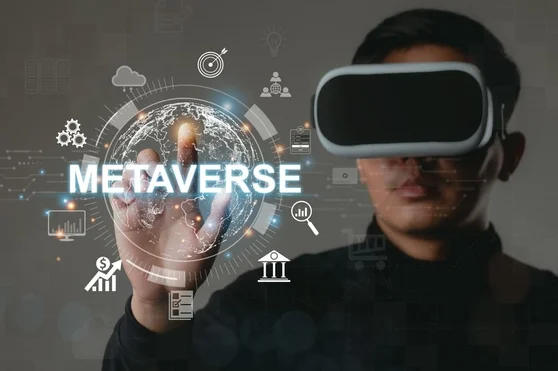Introductory Overview of the Metaverse
The Metaverse is rapidly evolving from a futuristic concept to a virtual landscape where individuals can work, play, and interact in immersive digital environments. This new digital universe represents an exciting frontier for businesses, offering a platform to implement innovative marketing strategies. Brands can engage with consumers in previously unimaginable ways through virtual reality (VR), augmented reality (AR), and other cutting-edge technologies. These immersive tools allow companies to craft dynamic experiences that appeal to tech-savvy audiences.
Virtual worlds within the Metaverse enable consumers to engage in activities ranging from shopping and socializing to attending virtual events and exploring digital spaces. This shift is creating a unique ecosystem where brands can connect with their target audience on a deeper level. For instance, virtual storefronts can provide interactive product demonstrations, allowing consumers to explore features and benefits in a way that traditional marketing channels cannot.
As businesses look to establish a presence in the Metaverse, they can leverage a range of immersive experiences to capture attention. Virtual reality can transport consumers to entirely new environments, creating memorable and impactful brand interactions. Augmented reality, on the other hand, can overlay digital elements onto the physical world, enhancing real-world experiences with virtual content. These technologies offer endless possibilities for creative engagement, from gamified marketing campaigns to interactive product launches.
Another key aspect of the Metaverse is its ability to facilitate social interactions through digital avatars. Consumers can attend virtual concerts, participate in online communities, and engage with brands in social VR spaces. This creates opportunities for marketers to foster a sense of community and build brand loyalty through shared experiences. By creating engaging and interactive environments, brands can cultivate a strong emotional connection with their audience.
The integration of advanced technologies within the Metaverse also allows for highly personalized marketing. Data-driven insights enable brands to tailor experiences to individual preferences, delivering targeted content that resonates with consumers on a personal level. This level of customization can enhance the effectiveness of marketing efforts, making interactions more meaningful and relevant to the audience.
Deciphering Consumer Behavior
In the Metaverse, consumer behavior takes on new dimensions as individuals navigate virtual spaces and interact with digital avatars. This emerging environment requires a nuanced understanding of how people engage with brands and make purchasing decisions. Traditional metrics and analytics need to be adapted to capture the unique patterns of virtual interactions.
One notable trend is the rise of digital goods and virtual economies. Items like digital fashion, virtual real estate, and NFTs are gaining popularity, driven by the desire for unique, customizable experiences. Brands can capitalize on this by offering exclusive virtual items or limited-edition digital assets that cater to the growing demand for personalization and exclusivity.
Consumer engagement in the Metaverse often involves participating in virtual events, attending digital concerts, and joining online communities. These activities provide valuable insights into user preferences and behaviors. Brands can analyze participation rates, interaction levels, and feedback to tailor their marketing strategies more effectively.
Another significant aspect is the role of social interactions. In the Metaverse, people frequently socialize in virtual worlds, forming communities around shared interests. This creates opportunities for brands to engage with consumers in a more organic and community-driven way. For instance, hosting virtual meetups or creating branded digital spaces can foster a sense of belonging and loyalty among users.
Virtual shopping experiences are also transforming consumer behavior. Unlike traditional e-commerce, virtual storefronts allow for interactive product exploration. Consumers can “try on” digital clothing, test virtual gadgets, or explore 3D models of products before making a purchase. This level of interactivity enhances the shopping experience and can lead to higher conversion rates.
Data privacy and security are critical considerations in understanding consumer behavior in the Metaverse. Users are becoming increasingly aware of how their data is collected and used. Brands must prioritize transparency and build trust by implementing robust data protection measures.
Finally, as technology evolves, so do consumer expectations. The seamless integration of VR and AR technologies is raising the bar for immersive experiences. Brands need to stay attuned to these shifts and continuously innovate to meet the evolving demands of their audience. By closely monitoring these trends and behaviors, companies can effectively navigate the complexities of the Metaverse and build stronger connections with their consumers.
Prospects for Brand Engagement
The Metaverse presents an unprecedented opportunity for brands to engage audiences in novel and interactive ways. Imagine creating virtual stores where customers can not only browse products but also engage with them through immersive experiences. These digital spaces can offer interactive product demonstrations, virtual fitting rooms, or even gamified shopping experiences, all of which can enhance consumer engagement and satisfaction.
Another promising aspect is the use of augmented reality to overlay digital elements onto the physical world. This allows brands to create unique marketing campaigns that bridge the gap between online and offline experiences. For example, AR can be used to offer virtual try-ons for fashion items or place virtual furniture in a consumer’s home before making a purchase. These applications add a layer of interactivity that traditional marketing methods lack.
Social interactions within the Metaverse provide another avenue for brand engagement. Digital avatars and online communities enable users to participate in virtual events, concerts, and meetups. Brands can sponsor these events or even host their own, providing a platform for consumers to connect over shared interests. This not only increases brand visibility but also fosters a sense of community among users, making them more likely to develop brand loyalty.
Virtual economies and digital goods are also gaining traction, offering new revenue streams for brands. By creating exclusive digital items or limited-edition virtual assets, brands can tap into the growing demand for unique, customizable experiences. These digital goods can be anything from virtual fashion to NFTs, allowing brands to offer something truly special to their audience.
Personalization is another key prospect in Metaverse marketing. With the wealth of data available, brands can craft highly targeted marketing campaigns that resonate with individual users. Whether it’s through tailored content, personalized recommendations, or customized virtual environments, the ability to cater to individual preferences can significantly enhance consumer satisfaction and loyalty.
Additionally, the Metaverse allows for seamless integration of various media forms, from video and audio to interactive elements. Brands can create multi-sensory experiences that captivate the audience and leave a lasting impression. By leveraging the unique capabilities of VR and AR, companies can develop marketing strategies that are not only innovative but also deeply engaging.
Challenges and Important Considerations
The Metaverse offers boundless opportunities for brand engagement, but it also comes with its own set of challenges. One of the primary concerns is data privacy and security. As virtual environments necessitate the collection of extensive personal data, safeguarding this information becomes crucial. Brands must implement stringent data protection measures to maintain consumer trust and comply with regulations.
Another significant challenge is the technological infrastructure required to support immersive experiences. High-speed internet, advanced hardware, and reliable software are essential for users to access and interact within the Metaverse. This dependency on technology can limit the reach of marketing efforts to audiences who lack access to these resources. Brands must consider these limitations when designing their campaigns.
Content moderation and digital conduct also present challenges. In virtual worlds, user-generated content and interactions can sometimes lead to inappropriate behavior or harmful content. Brands need to establish clear guidelines and robust moderation strategies to ensure a safe and welcoming environment for all users. This is particularly important for maintaining brand reputation and fostering a positive community experience.
The evolving nature of the Metaverse poses another challenge. As technologies like VR and AR continue to advance, brands must stay agile and adapt their strategies to keep pace with these developments. This requires continuous investment in research and development, as well as a willingness to experiment with new approaches.
Monetization models within the Metaverse are still being defined. While virtual goods and digital assets offer new revenue streams, understanding their value and how to effectively market them requires a deep understanding of consumer behavior in this unique environment. Brands need to be cautious and avoid over-commercialization, which could alienate users and undermine the authenticity of the virtual experience.
Lastly, the Metaverse’s global nature introduces complexities related to cultural differences and regional regulations. Brands must navigate varying legal landscapes and cultural nuances to create inclusive and compliant experiences. This requires a nuanced approach to marketing that respects and acknowledges the diversity of the Metaverse’s user base.
Future Directions in Metaverse Marketing
As we look to the future, marketing in the Metaverse will continue to evolve, driven by rapid advancements in technology and changing consumer behaviors. One exciting development on the horizon is the increased use of mixed reality, which combines elements of both physical and digital environments. This will enable brands to create highly engaging and interactive experiences that seamlessly blend real-world and virtual elements, providing consumers with unique and memorable interactions.
Artificial intelligence (AI) and machine learning will play a crucial role in shaping the future of Metaverse marketing. These technologies will allow for even greater levels of personalization, as AI can analyze user behavior in real time to deliver tailored content and recommendations. This means brands will be able to offer highly relevant experiences that resonate deeply with individual consumers, enhancing engagement and loyalty.
Blockchain technology is another promising area for Metaverse marketing. By leveraging blockchain, brands can create secure and transparent ecosystems for digital goods and transactions. This will be particularly important for managing virtual economies and ensuring the authenticity and ownership of digital assets such as NFTs. Blockchain can also enhance trust and security, addressing some of the privacy and data protection concerns that are inherent in virtual environments.
As the Metaverse continues to grow, we can expect to see the development of more sophisticated and immersive virtual worlds. These environments will offer brands new opportunities to create rich, multi-sensory experiences that captivate audiences. For example, advancements in haptic technology could allow users to physically feel virtual objects, adding an extra layer of realism to brand interactions.
Collaborations and partnerships will also become increasingly important in the Metaverse. By working together, brands can pool resources and expertise to create more compelling and innovative experiences. These collaborations could take many forms, from co-branded virtual events to integrated marketing campaigns that span multiple virtual worlds.
Finally, the Metaverse will likely see the rise of new social platforms and networks, designed specifically for virtual interactions. Brands will need to stay attuned to these emerging platforms and adapt their strategies accordingly, ensuring they remain relevant and engaging in this ever-changing digital landscape.
Closing Thoughts
As the Metaverse evolves, it presents an unparalleled opportunity for brands to engage with their audiences in ways that were previously unimaginable. The blend of virtual and augmented reality offers a fresh canvas for creating memorable experiences, fostering brand loyalty, and driving growth. To truly capitalize on this, brands must be proactive in adapting to this new landscape.
A key strategy for success involves leveraging the immersive nature of the Metaverse to craft personalized and engaging experiences. By utilizing data-driven insights, brands can tailor their offerings to meet individual preferences, creating a deeper connection with consumers. This level of personalization not only enhances user satisfaction but also builds lasting loyalty.
Another essential consideration is the importance of staying current with technological advancements. As VR, AR, and AI continue to advance, brands must be agile and ready to integrate these innovations into their marketing strategies. Continuous learning and adaptation will be crucial for maintaining a competitive edge in this dynamic environment.
Additionally, brands should focus on building trust through robust data privacy measures. With increasing concerns about data security, transparency and ethical practices will play a significant role in fostering consumer trust. Brands that prioritize these aspects are more likely to succeed in establishing a positive reputation within the Metaverse.
Collaborations and partnerships will also be vital. By joining forces with other brands or influencers, companies can create richer, more engaging experiences that resonate with a broader audience. These alliances can provide the creative and technical resources needed to push the boundaries of what’s possible in the Metaverse.
In summary, the Metaverse offers a wealth of opportunities for innovative marketing and brand growth. By embracing immersive technologies, prioritizing personalization, staying abreast of technological advancements, and fostering trust through ethical practices, brands can navigate this new digital frontier successfully. The future of marketing lies in the Metaverse, and those who adapt early will be well-positioned to thrive.






